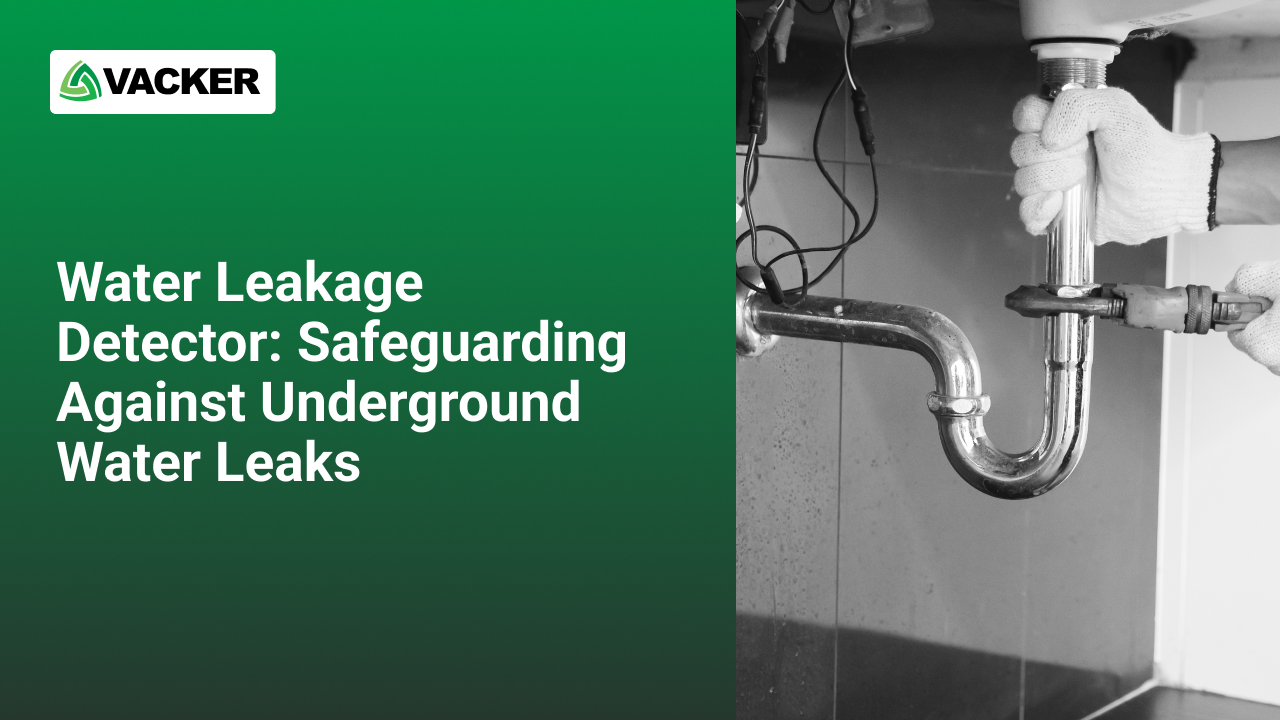A water leakage detector is a device designed to identify and detect the presence of water leaks in various settings, such as homes, buildings, infrastructure, and even underground pipes. It is an essential tool used to monitor and alert individuals or automated systems about potential leaks, allowing for early detection and prompt action to mitigate the damage caused by water leaks.
Water leaks can cause significant damage and lead to costly repairs if left undetected. When it comes to underground water leaks, early detection is crucial to minimize the impact on infrastructure, conserve water resources, and reduce financial losses.
Water leakage detectors use various technologies to sense and detect water, such as moisture sensors, probes, or even advanced electronic systems. These detectors are typically installed in areas prone to water leaks, such as basements, bathrooms, kitchens, and utility rooms. When water is detected, the detector triggers an alarm, sends notifications to a monitoring system or directly to the property owner, and sometimes even shuts off the water supply to prevent further leakage.
Let’s explore the importance of water leakage detectors, discuss the significance of underground water leak detection, and highlight the benefits of generating water leakage alarms to effectively address and prevent leaks.
The Significance of Water Leakage Detectors
Water leakage detectors are innovative devices designed to identify leaks in plumbing systems and infrastructure. These detectors play a crucial role in safeguarding against potential water damage, preventing water wastage, and promoting sustainable water management. Here are a few reasons why water leakage detectors are essential –
- Early Leak Detection -Water leakage detectors utilize advanced sensing technology to identify leaks at their early stages. This proactive approach helps prevent further damage and the associated expenses of repairs and restoration.
- Conservation of Water Resources – Underground water leaks can go unnoticed for an extended period, resulting in the wastage of a significant amount of water. By promptly detecting and repairing leaks, water leakage detectors contribute to water conservation efforts and promote responsible water usage.
- Cost Savings – Undetected water leaks can lead to substantial financial losses due to increased water bills and potential structural damage. Water leakage detectors help minimize these expenses by identifying and addressing leaks before they escalate into larger issues.
- Preserving Infrastructure – Underground water leaks have the potential to damage the foundations of buildings, roads, and other structures. By promptly detecting and repairing leaks, water leakage detectors help preserve infrastructure integrity and prevent costly repairs and disruptions.
The Importance of Underground Water Leak Detection
Underground water leaks pose a unique challenge as they are often hidden from sight. These leaks can occur in water supply lines, sewage systems, irrigation networks, and other underground infrastructure. Detecting and addressing such leaks promptly is crucial to mitigate the following risks:-
Structural Damage
Underground water leaks can erode soil, compromise the stability of foundations, and weaken structural integrity. Over time, this can lead to subsidence, sinkholes, and structural failures.
Environmental Impact
Water leaks from underground pipes can contaminate the soil and nearby water bodies, causing harm to the environment and potentially affecting groundwater quality. Timely detection and repair minimize the impact on ecosystems and prevent pollution.
Water Supply Disruptions
Large-scale underground water leaks can result in reduced water pressure or complete water supply disruptions, affecting residential, commercial, and municipal users. Identifying and repairing leaks promptly helps maintain a consistent water supply.
Benefits of Water Leak Reports
Water leakage alarms are based on data collected by water leakage detectors and provide valuable insights that facilitate effective leak management and prevention strategies. Here are some key benefits of water leak reports: –
- Identification of Leak Patterns
Water leakage alarms can help identify recurring leak patterns, allowing for targeted inspections and maintenance in specific areas. This data-driven approach optimizes resources and reduces response time to future leaks.
- Prioritization of Repairs
Water leakage alarms provide information on the severity and frequency of leaks, enabling prioritization of repair efforts. This ensures that critical leaks are addressed promptly, minimizing potential damage and water loss.
- Performance Monitoring
By analyzing water leak reports over time, it becomes possible to assess the effectiveness of repair and maintenance activities. This monitoring helps identify areas that require further attention and enhances the overall efficiency of leak management strategies.
- Decision-Making and Resource Allocation
Water leak reports offer valuable data for decision-making processes, such as infrastructure upgrades, system expansions, and resource allocation. This data-driven approach optimizes investments and ensures effective utilization of available resources.
Conclusion
Water leakage detectors play a vital role in protecting against underground water leaks by enabling early detection, conserving water resources, and minimizing financial losses. The importance of underground water leak detection cannot be overstated, as it helps prevent structural damage, environmental impact, and disruptions in water supply.
Additionally, generating water leak reports based on collected data provides valuable insights for effective leak management, prioritization of repairs, performance monitoring, and informed decision-making.
By leveraging water leakage detectors and utilizing water leakage alarms, individuals and organizations can proactively address leaks, promote water conservation, and ensure the sustainable management of water resources.




Leave a Reply